17 Best Tools For SEO Competitor Analysis

Keep your friends close but your competitors closer… When it comes to SEO, this saying is absolutely true. If you want your website to succeed in the search engine, which will result in increased web traffic, conversion rate and revenue, you must track your competitors on a daily basis. How do you do that? Check today’s article for useful tools!
A number of SEO tools can help you with the competitor website analysis. Below I present the most important ones. Thanks to them you can check the website traffic, backlinks, the level of website optimization, content quality, mail marketing strategies, or social media activity of your biggest competitors.
So here it is…
17 best SEO competitor analysis tools:
- WooRank
- Ahrefs
- MozBar
- Majestic
- Alexa
- SpyFu
- SEMrush
- Feedly
- Google Alerts
- SimilarWeb
- BuzzSumo
- Owler
- Mention
- Social Searcher
- Awario
- Mailcharts
- Advanced Web Ranking
1. WooRank
WooRank is a great tool that shows you a little bit of everything during competitor website analysis. If you want to make a quick and very rough analysis of a given competitor, WooRank will provide you with practically everything you need.
All you have to do is enter the address of your competitor’s website and the tool will prepare a full page optimization report for you in less than a minute.
What information will you find there?
- content: title tag, meta description, Google Preview, heading structure, an alt attribute
- indexing: robots.txt, XML sitemap, hreflang tags
- mobile-friendliness
- structured data
- security (SSL)
- backlinks: their quality, referring domains
- estimated traffic
- social media profiles
- and so much more…
2. Ahrefs
If you’ve ever tried SEO on your own before, you’ve certainly heard of Ahrefs– competitor analysis with this tool is a pleasure. This SEO tool is used by agencies practically all over the world, and the amount of data you can check there is almost overwhelming. So if you want to track your competitors’ activities, Ahrefs is absolutely a must.
This site explorer will allow you to check out the best organic keywords of your competitors that generate traffic to their websites. What’s more, you will also be able to get information about their estimated traffic and the quality of backlinks that lead to their websites.
Let’s focus especially on the last thing – backlinks. One of the main SEO strategies is to gain valuable backlinks for your website. If you were wondering how to find them, Ahrefs will definitely help you!
A short guide on how to check your competitors’ backlinks in Ahrefs:
Step 1: Enter your competitor’s URL address.
Step 2: You’ll see the full page analysis conducted by Ahrefs, select Backlinks.
Step 3: Ahrefs will show you all the backlinks leading to your competitor’s site. Analyze them and try to build some links from these domains for your site.
Tip: Remember, however, it’s not the number of backlinks that matter, but their quality. Therefore, when analyzing your competitor’s backlinks, pay special attention to their Domain Rating (DR) and URL Rating (UR). The higher the DR, the more valuable the backlink.
3. MozBar
Have you ever heard of Domain Authority (DA) and Page Authority (PA)? These are among the most frequently indicated metrics to measure the level of optimization of the website. It is worth noting first of all the Domain Authority of a given website – the higher it is, the potentially greater the chance of success in the search results. Moz has also created a very useful Google Chrome extension called MozBar, thanks to which you can easily check DA, PA, spam score and other metrics of your competitor’s website.
How to do SEO competitor analysis with MozBar?
Step 1: Add MozBar extension to your Google Chrome.
Step 2: Create an account or log in (if you already have a Moz account).
Step 3: Go to your competitor’s website and analyze it.
With MozBar you will also be able to check quickly:
- on-page elements (URL, title, meta description, meta keywords, H1 and H2 headings, bold/strong, italic/em, alt text),
- general attributes (meta robots, page load time, IP address),
- link metrics (external followed links, linking root domains, total links),
- HTTP status.
4. Majestic
Speaking of backlinks, Majestic is another SEO tool that enables you to quickly discover referring domains and backlinks of your competitors. Thousands of links for analysis will be within your reach!
Majestic also offers its own SEO metrics, the most noteworthy of which are Trust Flow and Citation Flow. Trust Flow refers to the quality and reliability of the site, whereas Citation Flow is related to the number of incoming links, this indicator measures the value of a link based on the number of backlinks that lead to it.
5. Alexa
I bet you’ve heard of Alexa more than once. And if not, it’s time to catch up! When it comes to web ranking and SEO competitor analysis, Alexa has been one of the most advanced tools for so many years now.
When it comes to competitive analysis, Alexa will enable you to:
- discover who your competitors are,
- compare your web traffic, popularity and engagement metrics to competitors,
- do keyword research (both organic and paid keywords),
- identify popular topics,
- identify link-building opportunities.
6. SpyFu
If you need a rapid increase in traffic on your website, <b?pay-per-click is one of the best solutions. I know, it may seem too expensive to you, however, PPC can effectively increase leads and revenue.
In order to achieve rapid success, it is necessary to choose the right target keywords that have the greatest potential for conversion. And that’s what SpyFu will help you with. After entering the competitors’ address you will get a report that will show you their keyword strategy, both paid keywords, and organic search keywords.
Step 1: Enter your competitor’s address
Step 2: You will get a report with the number of organic and paid keywords to your competitor.
Step 3: Click the Organic keywords or Paid keywords tab and check which specific keywords are most profitable for your competitor. You can also export a report as CSV or PDF.
7. SEMrush
Without a doubt, SEMrush is one of the most popular and effective tools for competitor website analysis. This tool will work great from the beginning of your SEO journey. Even when you haven’t managed to identify your competitors yet, SEMrush will tell you who is your strongest competitor in Google search results based on common keywords. What’s more, you’ll find their lots of information about their website traffic, Google visibility, or the number of keywords in TOP10 or TOP50.
How to check the organic traffic of your competitor?
Step 1: Choose the country and device (desktop or mobile)
Step 2: Select what period you want to analyze, e.g. one month, one year, two years, and you will get a report of the estimated traffic trends.
Step 3: Analyze the most competitive competitor’s keywords and their positions in Google search results.
Tip: Pay attention to Volume – it shows the average number of times users have searched for a particular keyword during the last month.
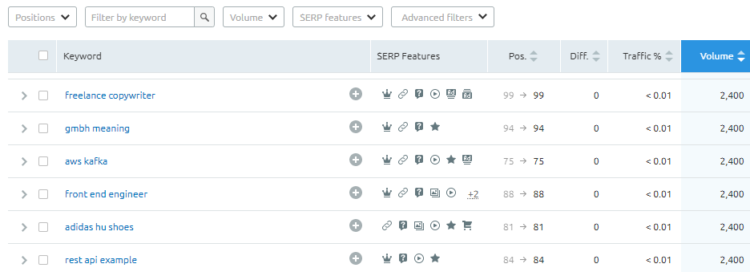
Step 4: Identify your competitors. If you still don’t know who your biggest competitor is, select Competitors and SEMrush will show your competition based on common keywords.
Tip: If you’re just at the beginning of your SEO adventure and your Google visibility is extremely low, SEMrush will most likely not show you real competitors. This is due to the fact that you don’t appear in Google search results on a significant number of keywords yet.
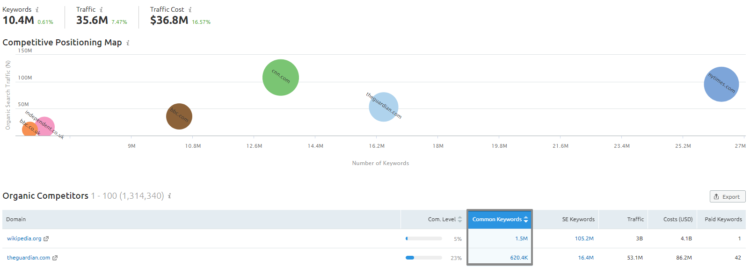
8. Feedly
Okay, maybe Feedly is not a typical SEO tool, but if you use its function properly, you will be able to successfully conduct a seo competitor’s content analysis on a daily basis. How? Create an account on Feedly and choose the topics that interest you most (these may also be specific keywords or domains of your competitors) – each time someone posts content on this topic, you will get a notification.
If you feel overwhelmed by the amount of content posted every day on various websites and social media, Feedly will be the perfect solution for you – you will be able to choose only the content that really interests you, and at the same time you will monitor your competitors’ activity.
9. Google Alerts
Google offers its users a very simple and easy-to-use tool – Google Alerts. Choose the topic you want to follow, and every time someone posts content about it, you will be notified by email. As simple as that!
10. SimilarWeb
Do you want to find out what is your competitor’s web traffic? Choose SimilarWeb! After entering the URL, you get a lot of valuable traffic data:
- total number of visits,
- user engagement (average visit duration, bounce rate),
- traffic by countries,
- sources of traffic (direct, referrals, search, social, mail),
- top referring and destination sites.
What’s important, all these data are shown in the form of very clear and legible graphs. SimilarWeb also gives you the option to compare two or more (in a paid version) websites – so you can see how your website looks in comparison with the competition.
11. BuzzSumo
As you probably already know, your business can gain a lot from running a company blog, especially if your content is of high quality, provides substantial knowledge, and responds to users’ needs (by the way, recently we’ve posted an exhaustive guide on how to boost blog conversion rates, check this out!).
BuzzSumo is a very useful tool especially for those of you who want to expand the content on a company blog. It will help you check which content is posted by your competitors and which topics are of most interest to users. Sounds promising, right?
How to find the right blog topics via SEO competitor analysis?
Step 1: Type in a topic that interests you (it could be any keyword, for example, “SEO competition”)
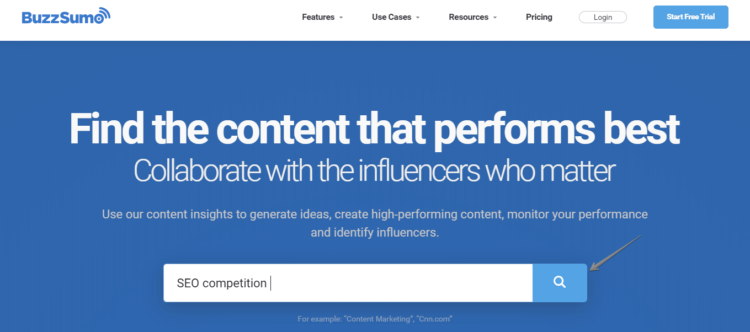
Step 2: Analyze which topics provide the greatest opportunity to increase user engagement, web traffic and conversion rate.
12. Owler
Interestingly, you don’t even have to analyze the competition by yourself anymore… Owler will do that for you! This analytical tool will make a list of your biggest competitors and keep you informed about all the news. Receive daily Newsfeed on the biggest companies in your industry.
13. Mention
Mention is one of the most useful tools to monitor social media. As we have already mentioned many times on our blog, social media has a really strong impact on SEO and is also a great source of backlinks. So if you want to have full control over your competitors, you should monitor their activities in social media. And that’s what Mention does best!
What can you benefit from Mention?
- look for mentions of your name and brand in various social media
- constantly monitor your competitors’ social media activities and the content they post
- measure share of voice
14. Social Searcher
Social Searcher is a tool quite similar to Mention – with its help you will be able to check how often, who and in which social media mentioned your brand. It’s a great tool that will tell you what users are currently talking about, which topics are of the highest interest.
Using Social Searcher is really easy – just enter the name of your competitor or the topic you want to check and you’ll see results from 11 of the most popular social media such as Twitter, YouTube, Flickr, Vimeo, Facebook or Reddit.
15. Awario
If you want to know what users (and your competitors) are currently talking about, try Awario. Track topics or profiles and every time they post something or mention a topic of your interest, you get an alert. Awario is the perfect tool for real-time marketing – react quickly and join the conversation. Thanks to Awario, you’ll never get left behind!
16. Mailcharts
If you want to conduct an in-depth competitive analysis, you certainly shouldn’t forget about email marketing. Finally, thanks to Mailcharts, you will be able to compare your email marketing strategy to your competitors.
What useful features does Mailcharts offer?
- You will be able to compare your email marketing strategy with the list of model practices proposed by the creators of this tool to see what you are doing right and wrong.
- You will check if your emails are optimized for mobile devices.
- You will receive a report on your competitors’ marketing strategies.
You still don’t believe that email marketing has an impact on SEO? Check my blog post where I explain how your brand can benefit from the right email marketing strategy.
17. Advanced Web Ranking
On the market for more than 18 years, Advanced Web Ranking is the longest-standing rank tracker suitable for both agencies and in-house SEOs.
Do you want to monitor your competitors up close or to deliver personalized reports to clients with your company brand name and logo? Advanced Web Ranking gives you all of this and much more under four pricing plans for all budgets.
SEO Tools for Competition Monitoring – Are They Really That Expensive?
Well, I’m not gonna lie to you – most SEO competitor analysis tools are not free-of-charge. Some of them only allow you to use certain features in the free version or give you a short free trial period. This is, of course, a good solution to check if a given tool meets your expectations before you decide on a paid subscription. Below I present which of the demonstrated SEO tools are free-of-charge and for which you have to pay.
| SEO tool | Free-of-charge/b> | Some free features | Full subscription required |
| WooRank | x | ||
| Ahrefs | x | ||
| MozBar | x | ||
| Majestic | x | ||
| Alexa | x | ||
| SpyFu | x | ||
| SEMRush | x | ||
| Feedly | x | ||
| Google Alerts | x | ||
| SimilarWeb | x | ||
| BuzzSumo | x | ||
| Owler | x | ||
| Mention | x | ||
| Social Searcher | x | ||
| Awario | x |
Conclusions
Above I have presented 16, in my opinion, the most important SEO tools, thanks to which you can effectively carry on with competitor website analysis and learn about their marketing strategies. There are definitely a lot more SEO tools – their choice depends above all on your expectations, needs, and… budget. If you need the help of real experts who know how important competitive analysis is for achieving success in SEO, contact us – let’s talk about your website.
And which tools for SEO competior analysis do you recommend? Let us know in your comment!



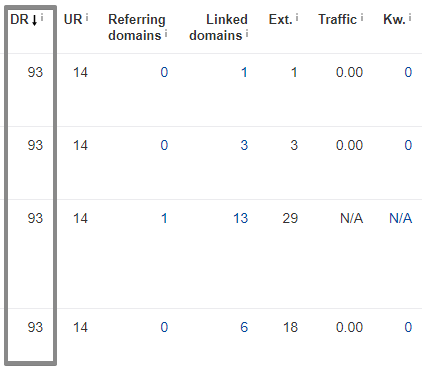

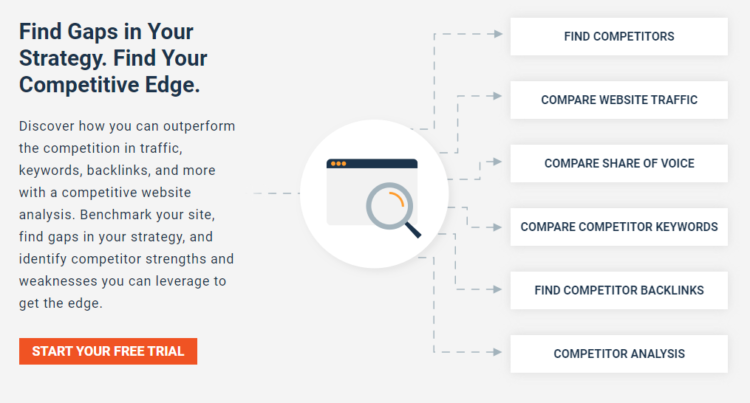
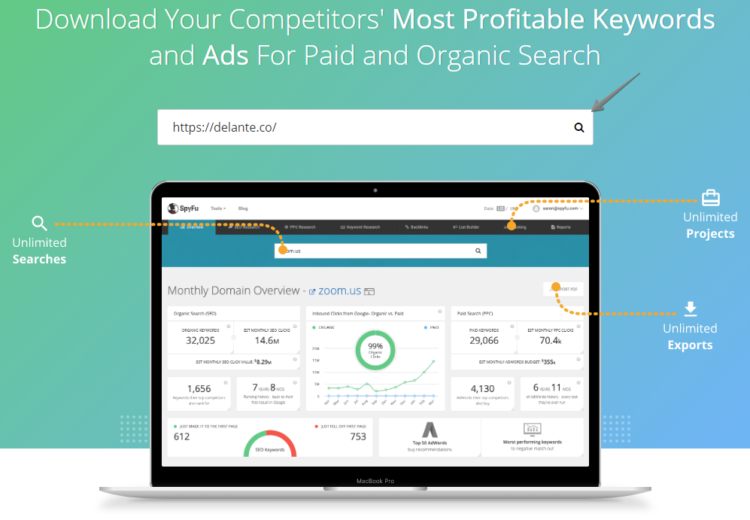




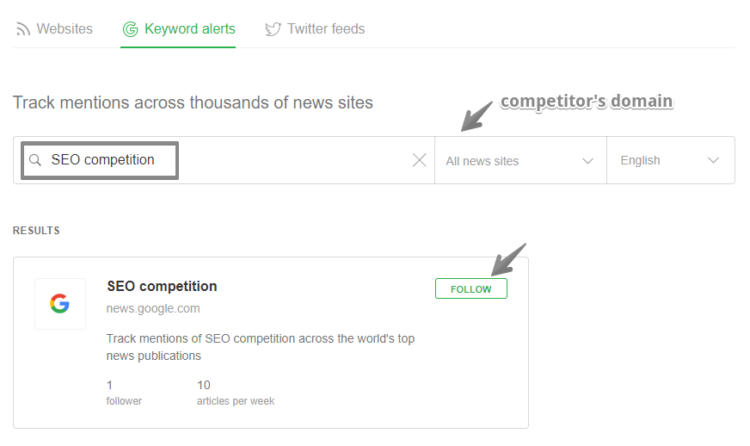

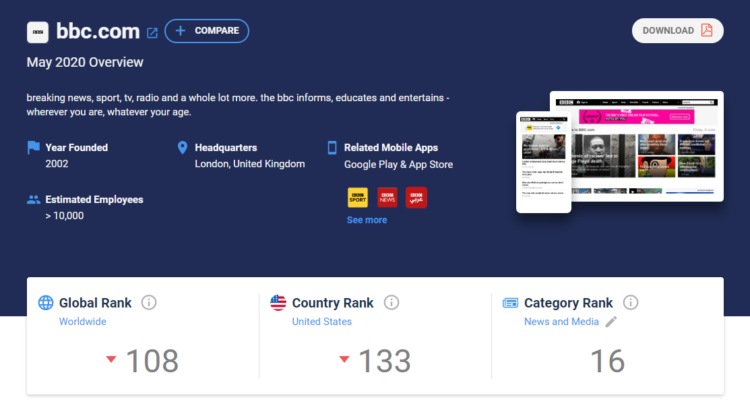

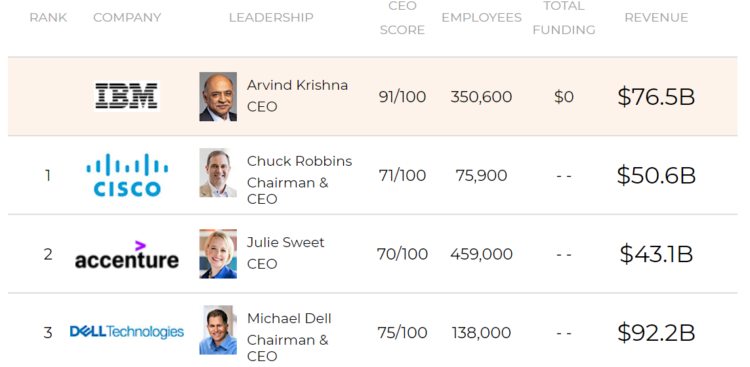
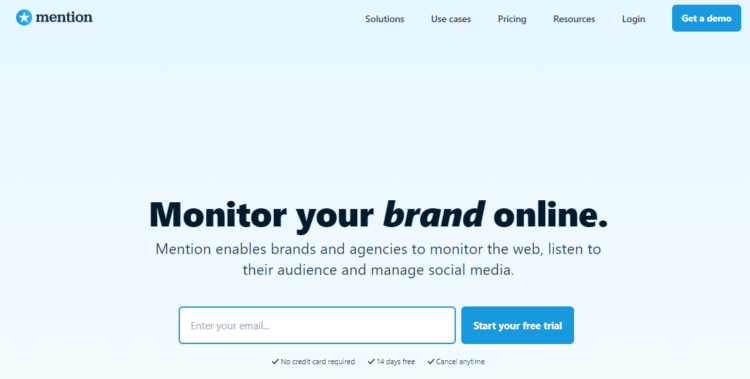
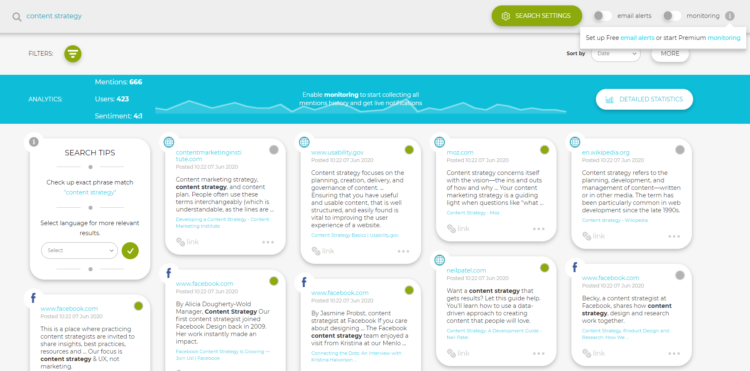

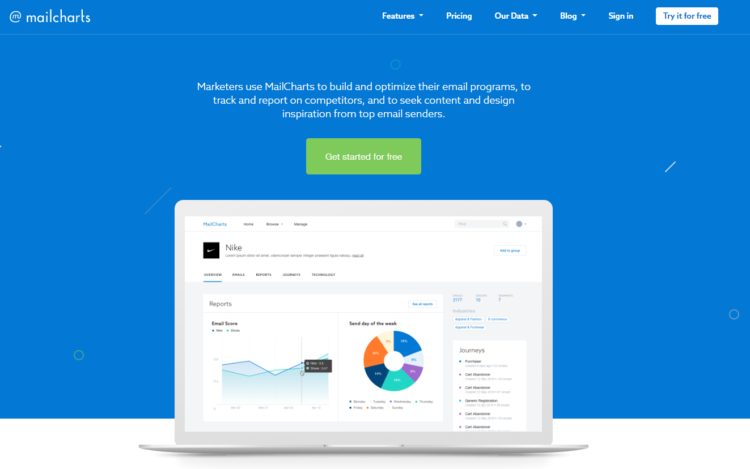
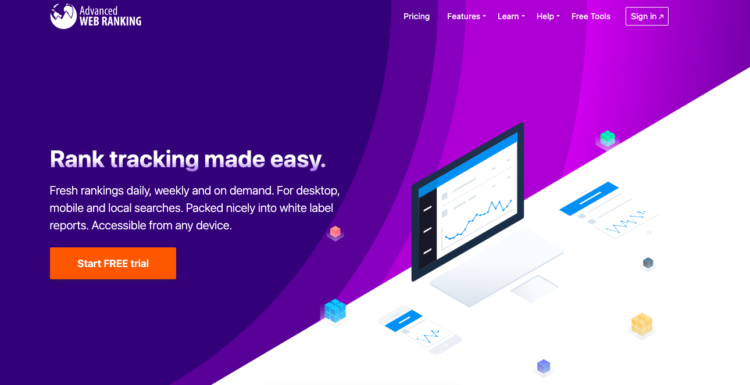



i think ahrefs is best tool for competitor audit, As it shows all links dr pr and traffic and latest link which is build on same day.